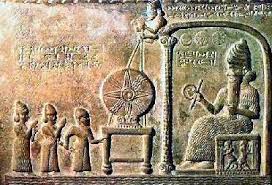
Benjamin Jones writes in Exodus: The Hammurabi Code
....
"The Covenant Code, the set of laws given by Yahweh to Moses, who conveyed them to the Israelites, bears a marked similarity to the law codes of Mesopotamia, including, in particular, the Code of Hammurabi. Many of the same moral and legal issues are addressed, and both the presentation of themes and the narrative style of the two documents bear a strong resemblance to one another".
Jones then asks:
"This similarity begs the question: what was the inspiration for the Covenant Code? Do the similarities between the Law of Hammurabi and the Covenant Code reflect similarities between the legal systems of Babylon and Judah, with the two systems and records developing simultaneously? Or was the law in Exodus appropriated directly from the laws of Hammurabi, as a philosophical or scholarly exercise?"
AMAIC Comment:
According to our revision of history, Hammurabi was King Solomon ruling Babylon. Hence the famous Laws of Hammurabi reflect the Law of Moses (Exodus) due to Solomon's and Israel's reverence for the great Lawgiver, Moses.